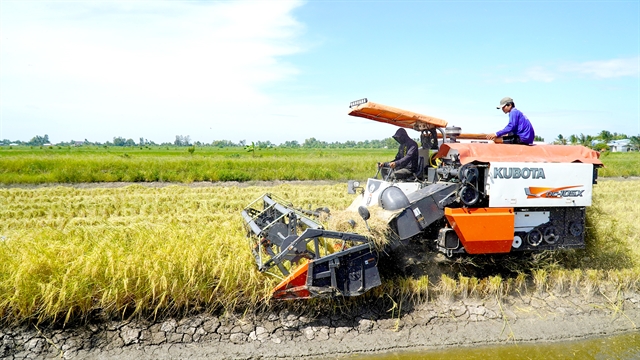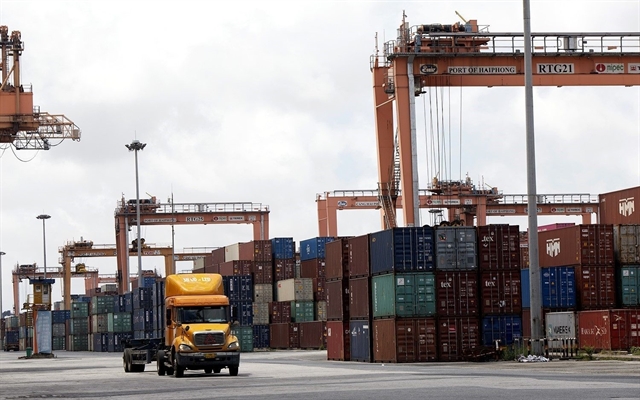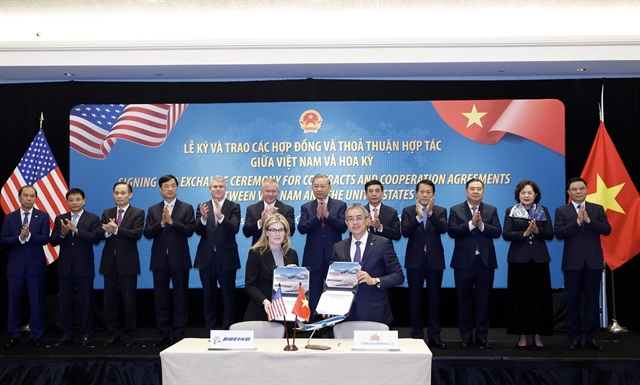 Society
Society

 |
| Shrimp-rice fields in Kiên Giang Province’s An Minh District. – VNA/VNS Photo Văn Sĩ |
HCM CITY – Provinces in the Cửu Long (Mekong) Delta are converting unproductive rice fields into farms growing high-value crops to boost agricultural efficiency.
The country’s largest rice-producing region has increasingly shifted to vegetable and fruit cultivation, as well as aquaculture, yielding significantly higher profits for farmers than mono-rice farming, according to local authorities.
Farmers across the delta, which comprises 12 provinces and Cần Thơ City, have transitioned to alternative crops and trees, rotated rice with short-term crops during the dry season or integrated aquaculture within rice fields.
In Trà Vinh Province, 500ha of unproductive rice fields will be converted this year.
Lê Văn Đông, deputy director of the Trà Vinh Department of Agriculture and Rural Development, said authorities are guiding farmers through the transition in line with regulations to ensure supporting infrastructure meets agricultural needs.
He advised farmers to establish concentrated farming zones, join co-operatives and adopt advanced techniques to improve productivity and secure steady markets.
Farmers switching to short-term crops earn two to three times more profits than from rice, while those cultivating perennial trees see profits rise by three to four times.
Last year Trà Vinh converted 1,146ha.
In Đồng Tháp Province too, farmers are enjoying higher incomes by shifting to alternative crops.
In 2024 more than 10,000ha of unproductive rice fields were repurposed for vegetables, mango, jackfruit, longan, and lime.
Fruit farming yields VNĐ50-200 million (US$2,000-8,000) per hectare annually, two to eight times the income from rice.
Nguyễn Văn Út of Láng Biển Commune, Tháp Mười District, has a one-hectare Thai jackfruit orchard on what was once an unproductive rice field, and it fetches him VNĐ200 million (US$8,000) in annual profits.
This year Đồng Tháp aims to convert over 1,800ha to grow crops such as corn, red chilli, sweet potato, taro, lotus, mango, jackfruit, and durian.
Nguyễn Phước Thiện, deputy chairman of the Đồng Tháp People’s Committee, said the shift would enhance land-use efficiency and improve farmers’ incomes.
It will also support the development of large-scale farming zones, strengthen branding for the province’s agricultural products and introduce production codes to facilitate exports.
The delta provinces encourage farmers to make the switch as it aligns with agricultural restructuring efforts and has proven effective.
Long An and Hậu Giang provinces plan to convert 9,616ha and 2,412ha.
Nguyễn Thanh Truyền, director of the Long An Department of Agriculture and Rural Development, said authorities would guide farmers in selecting crops suited to local water resources and saltwater intrusion conditions.
The department would collaborate with other local agencies to enhance agriculture quality and value by promoting research and advanced farming techniques, and companies would be encouraged to participate in large-scale field initiatives, he added.
Authorities in the delta are also working to improve irrigation infrastructure and soil fertility to support the transition.
They are introducing training programmes and financial assistance schemes to help farmers adopt new methods effectively.
The region's ongoing agricultural transformation reflects a broader strategy to boost productivity, increase resilience to climate change and enhance economic opportunities for farmers.
As more provinces embrace these changes, the shift from mono-rice cultivation to diversified high-value agriculture is expected to further strengthen the delta’s agricultural sector in the coming years. – VNS




